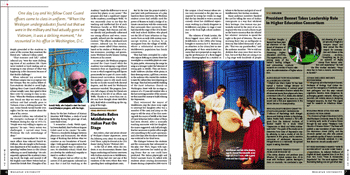Oral History Project
 Ron Jenkins, chair and artistic director of Wesleyan’s theater department, wrote the following story about the making of Over There, a play he directed at the CFA theater during Parents’ Weekend 2001.
Ron Jenkins, chair and artistic director of Wesleyan’s theater department, wrote the following story about the making of Over There, a play he directed at the CFA theater during Parents’ Weekend 2001.
In the fall of 2000, when the students in my documentary theater class began conducting oral history interviews with Sicilian-Americans in Middletown, none of them had ever met any of the residents of the town where they were spending their undergraduate years.
But by the time the project ended a year later with performances of a play based on those interviews, the Wesleyan student actors had artfully used the power of theater to build a bridge of intimate connections with the community that surrounds their university. They had shared the stage of the CFA theater with local school children who played out the life of Saint Sebastian in fragments from an early 20th-century manuscript written in Sicilian by an immigrant from the village of Melilli, where a substantial minority of Middletown’s population has family connections.
They had been serenaded by a tailor who repairs clothing on Liberty Street but moonlights as a mandolin player at a nearby pizza parlor, strumming the songs he sang as a teenager under the balconies of young girls in Melilli. They ate homemade cudderune (Sicilian white pizza) in their dressing rooms, a gift from a woman in the audience who wanted the students to taste the culture they were depicting on the stage. They had reenacted the building of the Saint Sebastian Church on Washington Street with the on-stage assistance of a 97-year-old resident who is the last surviving member of the committee that raised the money to build it during the Depression.
They witnessed the mayor of Middletown stop the show every night to interrupt her daughter (who was a member of the cast) and jump on the stage to tell the story of her first meeting with the mayor of Melilli at the Feast of Saint Sebastian before either of them had been elected. After a comically touching encounter with her daughter, the mayor suggested, only half-jokingly, that her ascension to public office might owe something to the saint’s assistance, and a few days after the show closed she was reelected to her third term.
The dialogue between the students and the community that culminated in the play Over There, began with tape-recorded interviews but ended up taking forms that no one could have predicted. The Italian playwright and Nobel Laureate Dario Fo talked with students about creating documentary theater during a September 2000 visit to the campus. A local woman whose stories were recounted in the play was so inspired by seeing her words on stage that she has decided to write a musical comedy about her childhood experiences working in a family drugstore in Middletown and plans to stage it next year at the local high school auditorium.
The relatives of Frank Lentini, the three-legged man (who settled in Middletown in the 1890s after being brought to America by P.T. Barnum as an attraction in his circus) lent us rare photographs of their extra-limbed ancestor that were projected on stage during the performance of a three-legged dance choreographed by a student in tribute to the humor and spirit of one of Middletown’s first Sicilian residents.
Many audience members thanked the cast for telling the story of Sicilian immigrants in a way that validated their heritage. One woman was particularly moved by the story of an immigrant who was in such a hurry to get on the boat to America that she refused her relatives’ invitation to spend the night in the port of Messina. The next morning there was an earthquake in Messina that killed thousands of people. “That was my grandmother,” said the audience member. “We’ve told our children that story since they were babies, but now that they are seeing it on a big stage with hundreds of people.
